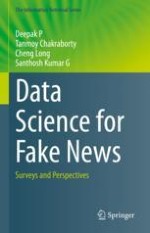2021 | OriginalPaper | Buchkapitel
Misinformation and the Indian Election: Case Study
verfasst von : Lyric Jain, Anil Bandhakavi
Erschienen in: Data Science for Fake News
Aktivieren Sie unsere intelligente Suche, um passende Fachinhalte oder Patente zu finden.
Wählen Sie Textabschnitte aus um mit Künstlicher Intelligenz passenden Patente zu finden. powered by
Markieren Sie Textabschnitte, um KI-gestützt weitere passende Inhalte zu finden. powered by
Diverse demographics, culture, and language; a troubled history of communal violence, polarised politics, and sensationalist media; and a recent explosion in smartphone ownership and Internet access have created a “fake news” crisis in India which threatens both its democratic values and the security of its citizens. One of the unique features of India’s digital landscape is the prevalence of closed networks – ideologically homogeneous groups of individuals communicating on private platforms – in which misinformation proliferates. This poses several challenges: the encryption of private messages makes tracking and analysing the spread of information through these channels difficult; accusations of censorship and surveillance can prevent governments from tackling misinformation propagated through private groups; ethical considerations associated with the extraction of data from encrypted, private conversations; highly influential means of disseminating information, with users receptive to messages which fit the common worldview of the group; and speed of proliferation, i.e. information spread to a large user base at the touch of a button. In this chapter, we showcase some of our core technologies in the areas of credibility and veracity assessment. Our key findings during the Indian general election 2019 indicate that individual users play a major role in the solution to fake news and misinformation. Adopting content verification strategies even by 1% of WhatsApp users will help vaccinate India’s WhatsApp networks against fake news. Whilst volume must increase, the speed of fact-checks is the vital improvement which the fact-checking industry must undergo – semi-automated fact-checks proved 35 times more effective than traditional fact-checks in fighting fake news on WhatsApp – to debunk rumours early in their propagation path and spread fact-checks to audiences that came across the original piece of problematic content.
